When former Taiwanese diplomat stationed in India, Fang Tien-sze (方天賜), called on India to send a military attache to Taiwan in a 2015 article for India Defense Review, the proposal was warmly received among Delhi’s policy think tanks.
“A lot of people have been floating the idea here,” says Namrata Hasija, research fellow at the Delhi-based Center for China Analysis and Strategy. “And I think it’s high time the Indian government act on it.”
Were it to occur, India, after the US and Singapore, would become the third country to officially have military advisers or trainers stationed in Taiwan.
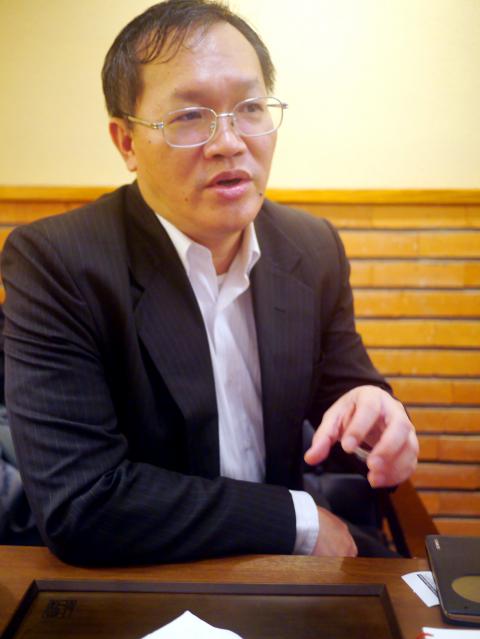
Photo: Liam Gibson
Specialists from both countries say there is vast potential to expand bilateral defense relations and with the two nation’s foreign policy agendas — India’s Act East and Taiwan’s New Southbound Policy — dovetailing in their aim to build new regional partnerships, as well as shared concerns over Chinese military expansion, the time may be ripe for a new level of engagement.
ATTACHE
Shen Ming-shih (沈明室), adjunct associate professor at Tamkang University’s Graduate Institute of International Affairs and Strategic Studies, says there is a good chance India will send an attache to Taiwan, noting that Indian Prime Minister Narendra Modi is more focused on relations with Taiwan than his predecessors.
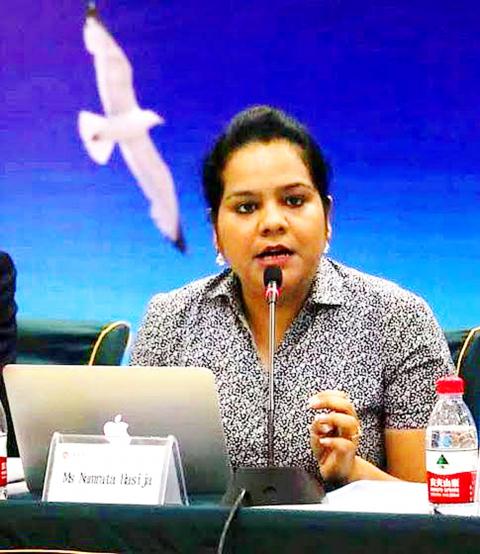
Photo: Ramesh Bhattarai
Shen adds that Taiwan has had military attaches stationed in its Taipei Economic and Cultural Center in Delhi since 2000, which has gradually raised the level of strategic cooperation between the nations.
“The rank of the officers that have been deployed there [Delhi] has gotten higher and higher over the years, reflecting the country’s closer strategic relationship,” Shen says.
Shen adds that India’s military must stand to gain in some way from sending an attache, just as Taiwan has benefited greatly from having advisers in Delhi.
Hasija, who is currently writing a book on the history of India-Taiwan relations, says that having an attache based in Taiwan would give India access to the latest intelligence on development of military facilities in China as well as deeper insight into China’s Peoples Liberation Army (PLA), which Taiwan’s military has researched in great depth.
“Taiwan is the best China-watcher,” Hasija says, adding that after last year’s Doklam border incident, a military stand off between the Indian army and the PLA, India must learn from Taiwan’s experiences in how to deal with territorial disputes with China.
Yet Hasija puts the current likelihood of an attache being sent at around 50 percent, saying concerns over a backlash from China remain.
“The shadow of China still looms large over Taiwan-India relations,” Hasija says.
She says that for many years, India requested a letter of approval from Chinese embassy officials in Delhi for any policy developments with Taiwan, but this has changed in recent years, especially since Modi took office in 2014.
Fang adds that after last year’s Doklam incident, India has grown more assertive in its dealings with China.
Fang says he recommends sending a retired officer to fill the attache post, as it would make the move less contentious for China.
MUTUAL BENEFITS
But attaches are not the only way forward. Fang adds that in lieu of direct weapons transactions, there is great potential for products that can be used for both civilian and military purposes, such as hi-tech fabrics, to be traded between the nations.
Hasija says submarine building is an area where India can further aid Taiwan, having had considerable success with their program, launching a second indigenous nuclear sub late last year.
Shen adds that further intelligence exchange and military-industrial cooperation would also be beneficial, especially in regard to missiles. He says that the technology behind India’s anti-naval cruise missile BrahMos and Taiwan’s new Hsiung Feng III are highly complementary and co-development of new missiles between the two nations may prove fruitful.
LACK OF VISION
Yet despite these opportunities, Fang says Taiwan isn’t proactive enough in its engagement with India.
“We lack a long-term plan,” he says. “This is evident from the fact that there is no graduate institute of Indian studies in Taiwan.”
Fang says Taiwanese students are keen to learn more about South Asia as shown by a summer course titled “India Studies,” that was held at Tsinghua University last year and attracted over 200 applicants.
Shen agrees that Taiwan’s research on India is insufficient and that to create a broader diplomatic vision for India, higher levels of education exchange with the South Asian power are required.
He adds that in a broader sense, Taiwan needs to diversify its strategic alliances and India is a natural partner as it shares democratic values with the nation.
At a time when the direction of US foreign policy is shrouded in uncertainty, fostering closer defense ties with other powers in the Indo-Pacific region is in Taiwan’s best interest. With both Delhi’s and Taipei’s strategic goals closely aligned, this is an optimal time for the two sides to collaborate further, such as with an attache deployment. Yet for a committed partnership or even alliance to be achieved, Taiwan needs to craft a long-term plan for engagement with India and invest deeply in education resources and research on the South Asian region.
“We cannot afford to ignore Taiwan… Until now, India’s Act East Policy has been based around trade, but now we must include defense strategy too… and Taiwan should be a part of that,” Hasjia says.
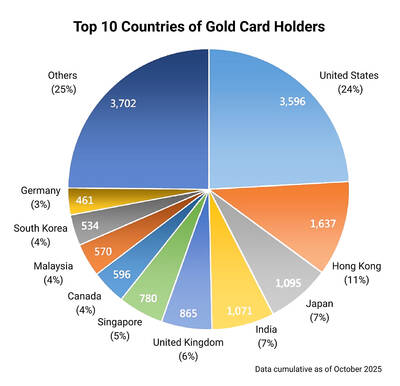
Seven hundred job applications. One interview. Marco Mascaro arrived in Taiwan last year with a PhD in engineering physics and years of experience at a European research center. He thought his Gold Card would guarantee him a foothold in Taiwan’s job market. “It’s marketed as if Taiwan really needs you,” the 33-year-old Italian says. “The reality is that companies here don’t really need us.” The Employment Gold Card was designed to fix Taiwan’s labor shortage by offering foreign professionals a combined resident visa and open work permit valid for three years. But for many, like Mascaro, the welcome mat ends at the door. A
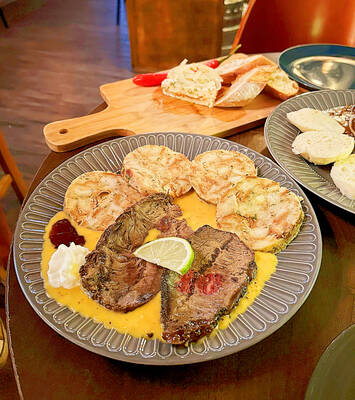
Divadlo feels like your warm neighborhood slice of home — even if you’ve only ever spent a few days in Prague, like myself. A projector is screening retro animations by Czech director Karel Zeman, the shelves are lined with books and vinyl, and the owner will sit with you to share stories over a glass of pear brandy. The food is also fantastic, not just a new cultural experience but filled with nostalgia, recipes from home and laden with soul-warming carbs, perfect as the weather turns chilly. A Prague native, Kaio Picha has been in Taipei for 13 years and
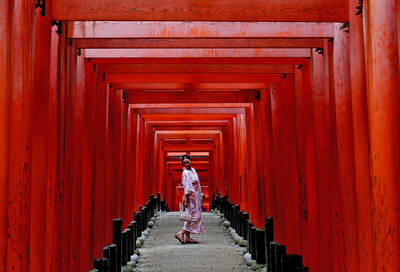
The Western media once again enthusiastically forwarded Beijing’s talking points on Japanese Prime Minister Sanae Takaichi’s comment two weeks ago that an attack by the People’s Republic of China (PRC) on Taiwan was an existential threat to Japan and would trigger Japanese military intervention in defense of Taiwan. The predictable reach for clickbait meant that a string of teachable moments was lost, “like tears in the rain.” Again. The Economist led the way, assigning the blame to the victim. “Takaichi Sanae was bound to rile China sooner rather than later,” the magazine asserted. It then explained: “Japan’s new prime minister is
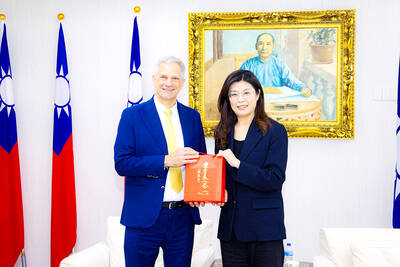
Since Cheng Li-wun (鄭麗文) was elected Chinese Nationalist Party (KMT) chair on Oct. 18, she has become a polarizing figure. Her supporters see her as a firebrand critic of the ruling Democratic Progressive Party (DPP), while others, including some in her own party, have charged that she is Chinese President Xi Jinping’s (習近平) preferred candidate and that her election was possibly supported by the Chinese Communist Party’s (CPP) unit for political warfare and international influence, the “united front.” Indeed, Xi quickly congratulated Cheng upon her election. The 55-year-old former lawmaker and ex-talk show host, who was sworn in on Nov.